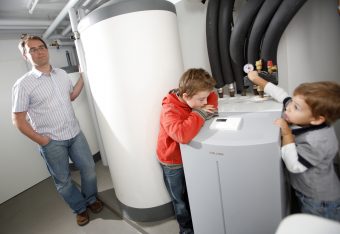According to the Institute for Energy Research, demand for fossil fuels globally skyrocketed during 2018, triggering a consequent increase in carbon dioxide emissions, despite the significant share of renewables in the planet’s energy mix. Increased demand for energy is attributed, among other things, to weather conditions that forced the population from different parts of the world to rely more on heating and cooling the premises. Coal, oil and gas certainly have their eco-friendly alternatives heating the space during the winter days – and at the same time its cooling during summer
For users who want to save both their own financial resources and the environment from the negative impact, heat pumps are an excellent option. They work on the principle of “reverse refrigerator” and they “extract” the accumulated heat from air, groundwater or soil, and increase it. That way, a large amount of energy of relatively low-temperature becomes high-temperature energy.
The main advantage of heat pumps over the competition in the market for heating and cooling appliances is that the facilities equipped with heat pumps receive much more energy compared to the costs. The system is powered by electricity and generates between 3.5 and 6 kW of thermal energy per kilowatt consumed.
Investment costs for heat pumps

We contacted the experts of the partner company CEEFOR (Center for Energy Efficiency and Sustainable Development) asking how much it would cost us to heat and cool a 60 m2 house or apartment with a heat pump. They explained that in this situation, the most appropriate choice would be an air-to-water heat pump since water-to-water and ground-to-water are more suitable for larger buildings – private houses.
The price of the recommended 9 kW heat pump is approximately € 1,700 in our country. With the cost of installing a heat pump, installing underfloor heating and installing a hot water system and air conditioning, the total investment would reach 7,000 euros.
The heat pump recommended to us, according to the engineers’ calculations, would generate 3.5 kW of thermal energy per each kilowatt consumed.
The payback period depends on the energy class of the household, as well as the way it was previously heated.
The company engineers calculated your annual heating costs during a heating season of 180 days if you live in an average isolated home already of previously mentioned square footage. It mostly depends on current costs how much it pays off to install a heat pump.
The fastest return on investment for a heat pump installation will be achieved by those households that are heated with propane-butane gas and electricity, considering the current situation in the market. In eight or thirteen years they will be “in the black”. There is also a possibility of shortening the repayment period of the investment – the heat pump installation through programming device operation during the lower tariff – 0.04 €/kWh. In this case, the total amount of your bills in the heating season will be 102.86 €. The payback period will be shortened to 7 years if you use propane-butane gas for heating, or 11 years if you use electricity.
However, as other energy sources skyrocket as well, it is a matter of time before our table in attachment becomes “outdated” – and your repayment period if you use pellets for heating, for example, shortens drastically.
In focus:
Other benefits of heat pumps
Of course, saving is just one of the motives for the energy transition of households, so additional benefits of heat pumps should not be neglected.
Quiet, fully automated and easy to operate, depending on the regime, they can be used both for heating and cooling, and their use in hot water preparation is increasingly being represented.
On top of that, maintenance is unnecessary. Manufacturers emphasise that by introducing heat pumps smoke, ash, heating with wood or coal, as well as “leakage” and condensation on boilers, will sink into oblivion. There are no worries and additional expenses for connection, meters and tanks, and before winter, there is no need to stock up on any energy product. They have a long-life expectancy.
With the application of adequate energy efficiency measures, the usefulness of heat pumps is further increased.
They also have a positive effect on air quality, reducing carbon dioxide emissions by up to 50 per cent over petroleum-based heating.
Prepared by: Jelena Kozbasic
This article was published in the new issue of the Energy portal Magazine NATURAL RESOURCES, march – may, 2020

